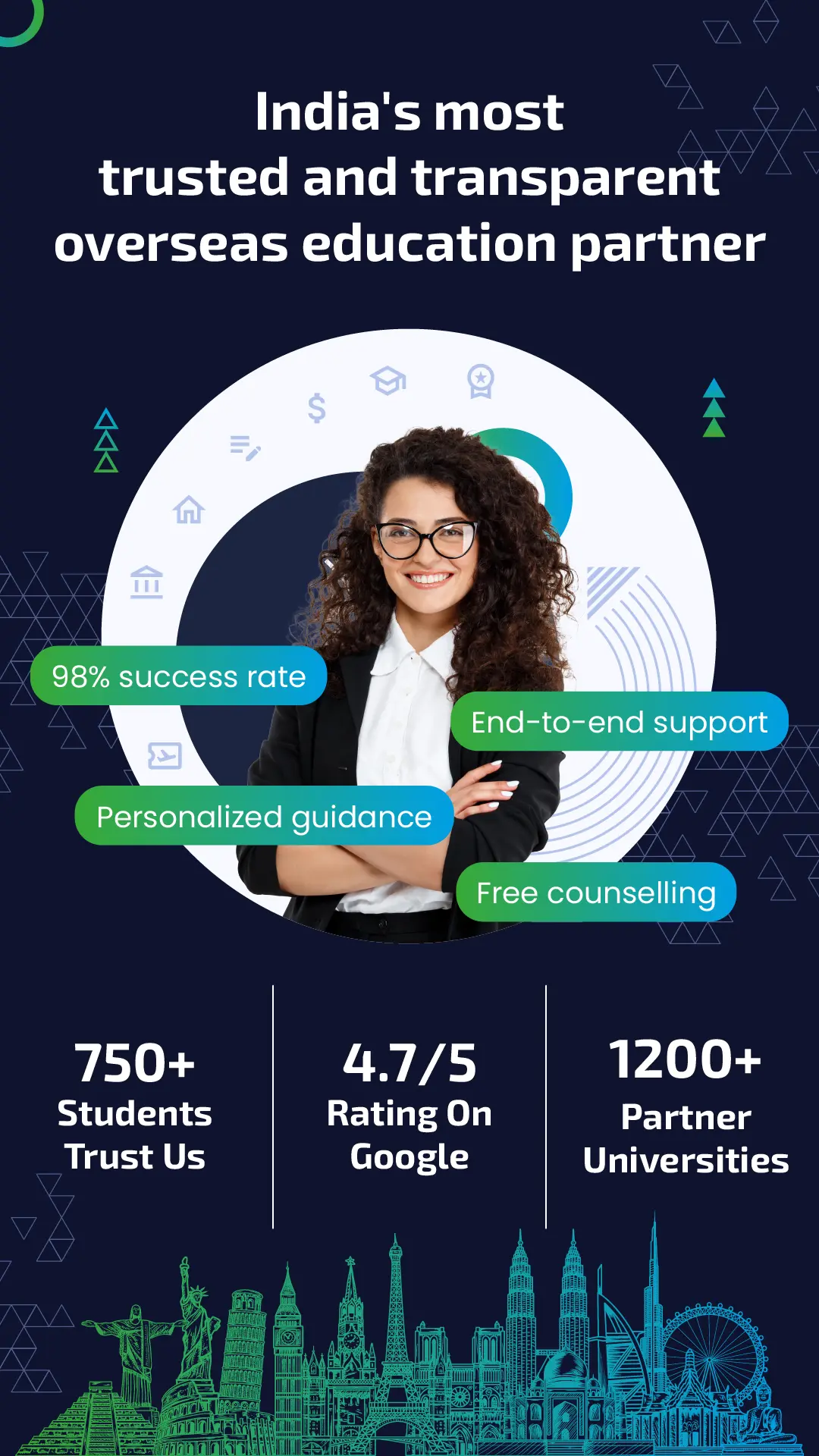Study in Dubai
30+ Global Campuses
30+ Internationally Ranked Institutions
With/Without IELTS*
you can apply With/Without IELTS*
90% Employability Rate
Degrees that lead to jobs
Scholarships
Apply For Upcoming Intake
Why Dubai?
Dubai dazzles as a global crossroads where ultramodern ambition meets rich Emirati traditions, making it an exciting destination to study in Dubai for Indian students seeking global exposure and modern education. It is the second largest emirate by territorial size after the capital, Abu Dhabi. Picture soaring skyscrapers like the Burj Khalifa rising amidst golden dunes, iconic souks, and a cosmopolitan melting pot of 200+ nationalities. Whether working out on a yacht, exploring desert safaris, or enjoying incredible arts at Alserkal Avenue, Dubai is more than a city—it’s an electrifying journey of discovery and possibility.
Dubai is a turbocharged hub of innovation and opportunity. With cutting-edge industries—from AI to finance and renewable energy—it’s a sandbox for future game‑changers. Its ambition is global, evident in a booming startup scene and frequent ultra‑tech events like GITEX and World Expo 2020 legacy.
Study here, and you’ll share classrooms—with scholars from the world’s most prestigious branch campuses including University of Wollongong, Heriot-Watt University, and Middlesex University. With its liberal, English‑friendly environment and a lifestyle resonating with both East and West, Dubai is where growth, culture, and global vision collide.
Top Universities & Colleges in Dubai
Study in Dubai means world-class degrees, multicultural classrooms, and career-ready learning in one of the world’s fastest-growing hubs, which is why many choose to study in Dubai for Indian students aiming for international careers. With international branch campuses, industry links in Dubai Internet/Media City, and purpose-built education zones like Dubai International Academic City (DIAC) and Dubai Knowledge Park (DKP), students get global quality with Middle East opportunity.
Best Universities in Dubai for International Students
Each profile covers location, what they’re known for, and why students choose them—with GEO cues so your readers can picture the neighborhood.
American University in Dubai (AUD) — Dubai Media City
Where: A gated, 1M+ sq.ft campus in Dubai Media City, steps from tech and media giants.
Why it stands out: US-style education, vibrant campus life, scholarships (incl. William J. Clinton Scholarship).
Good for: Business, Communication, Engineering, Architecture.
Middlesex University Dubai — Dubai Knowledge Park (+ DIAC study hub)
Where: DKP (Blocks 15–17) with a study hub in DIAC.
Why it stands out: UK degree from a London university; big community and strong employability links in DKP/Media City/Internet City.
Good for: Business, Computing/AI, Law, Media.
Heriot-Watt University Dubai — Dubai Knowledge Park
Where: New, purpose-built campus at DKP.
Why it stands out: Research-active UK university known for Engineering, Construction, and Business; new DKP campus inaugurated 2023.
Good for: Mechanical/Civil Engineering, Data Science, Project Management.
Russell Group Universities
Russell Group Universities at a Glance
| University | Global & National Strengths |
|---|---|
| University of Cambridge & Oxford | Consistently in top 10 globally (QS, THE, ARWU) — unmatched prestige and academic legacy. |
| Imperial College London | STEM powerhouse; top rankings and exceptional employability. |
| UCL & LSE | Innovation hub, diverse student body, and leadership in social sciences. |
| Edinburgh, Manchester, Bristol | Strong research, vibrant cities, favourable for international students and graduate outcomes. |
Transform Aspirations into Achievements
Top Courses to Study in Dubai
Dubai is unapologetically career-oriented. Degrees here are designed around real sectors—aviation, finance, tech, healthcare, hospitality, design—powered by free-zone ecosystems like Dubai International Academic City (DIAC) and Dubai Knowledge Park (DKP), and plugged directly into employers across Dubai South (Al Maktoum International/DWC), Dubai Internet City, Dubai Media City, Dubai Silicon Oasis, and Dubai Healthcare City (DHCC). That means sharper curricula, mentor access, internships, and faster hiring.
Dubai’s economic push backs this up: the emirate recorded 9.88 million international visitors in H1 2025 (a surge sustaining hospitality, retail, events, and aviation hiring), while the UAE AI Strategy 2031 and the Dubai 2040 Urban Master Plan keep long-run demand strong for tech, data, construction, and urban design talent.
- Foundation & Diploma Pathway Programs Business & Management
- Computing, Al & Data Analytics
- Hospitality & Tourism Management
- Logistics & Supply Chain Management
- Healthcare & Life Sciences
- Sports, Events & Luxury Brand Management
- Project Management
- Cybersecurity & Software Engineering
- Architecture & Design
Top Cities to Study in Dubai
If you’re looking at the UAE for higher education, Dubai should be your first stop — but Abu Dhabi and Sharjah each bring something different to the table. Below we break down academic quality, lifestyle, affordability and career opportunities so students can pick the city that best fits their goals.
Why each city matters
Dubai — The global campus with career pipelines
Dubai is the region’s magnet for international branch campuses and industry clusters. Education hubs like Dubai International Academic City (DIAC) and Dubai Knowledge Park (DKP) host dozens of universities, training institutes and direct employer partners — which means easier internships, industry projects and part-time work options during study. DIAC in particular is built for large-scale student communities and streamlined student services.
Abu Dhabi — Research & government-backed excellence
Abu Dhabi hosts top, research-led institutions (for example Khalifa University and world-class campus initiatives) and heavy public investment in science and innovation. If you want strong research exposure, STEM infrastructure, or programs tied to national R&D priorities, Abu Dhabi is an excellent pick.
| City | Why students love it (student POV) | Top universities | Avg monthly student budget (est.) | Best for (courses / jobs) | Student tip |
|---|---|---|---|---|---|
| Manchester | Value for money + buzzy tech & media scene — big city perks without London prices. | University of Manchester, Manchester Met, Salford. | £1,100–£1,400 / month. | Engineering, Computer Science, Media & Creative industries. | Great for placements — companies actively recruit local grads. |
| Edinburgh | Classic campus city meets festival culture — brilliant for research & arts lovers. | University of Edinburgh, Edinburgh Napier, Heriot-Watt. | £1,200–£1,500 / month. | AI/CS, Medicine, Finance, Creative Arts. | Winters are chilly — but job fairs and festivals are gold for networking. |
| Glasgow | Friendly, cheaper Scottish option; good student life and strong creative/tech sectors. | University of Glasgow, Glasgow Caledonian. | £1,000–£1,300 / month. | Life sciences, music & media, engineering. | Check out student discounts everywhere — they’re generous here. |
Cost of Studying in Dubai
When it comes to studying abroad, Dubai offers the perfect balance of world-class education and affordability compared to destinations like the UK, USA, or Australia, making it ideal to study in Dubai for Indian students who want value-driven global education. With globally recognized degrees, a multicultural environment, and strong job opportunities in the UAE and Gulf region, students get real value for their investment.
While Dubai is more premium than some Asian countries, it is still cost-effective for those seeking international-quality education without paying the hefty price tag of the West.
Dubai offers internationally recognized degrees at competitive costs compared to the UK, US, or Australia. Tuition fees for undergraduate programs typically range from AED 35,000 to AED 75,000 per year, while postgraduate programs range from AED 45,000 to AED 100,000 per year, depending on the university and course. Professional programs like medicine or engineering may be on the higher end. Living expenses, including accommodation, food, transport, and utilities, usually range between AED 2,000 to AED 5,000 per month. Student visa costs approximately AED 3,500, and many universities offer flexible payment plans and scholarships, making Dubai a financially smart choice for quality international education.
| Archetype | Tuition (typical / year) | Living (annual est.) | Visa & IHS (1 yr) | Approx. total (1st year) | Notes |
|---|---|---|---|---|---|
| London — top uni (UG taught / business/CS) | £18,000–£32,000 | £18,000 (approx. £1,500/mo) | £524 + £776 = £1,300 | £37k–£51k | London = premium rent & subsistence. Use halls 1st year to save. |
| Major city (Manchester/Edinburgh) | £14,000–£25,000 | £13,200 (≈£1,100/mo) | £1,300 | £28k–£39k | Strong industry links; lower living costs than London. |
| Smaller city / postgrad (e.g., Nottingham, Newcastle) | £12,000–£20,000 | £12,000 (≈£1,000/mo) | £1,300 | £25k–£34k | Best for tighter budgets — good uni options available. |
| Medicine / Clinical (example) | £37,500 – £58,890 (varies by uni & year) | £13k–18k | £1,300 | £51k–£78k+ | Medicine fees can be very high — check course page (example: Edinburgh clinical fees). |
Dubai Student Visa for International Students
Getting your Student Residence Visa for Dubai is straightforward when you know the steps. Most student visas are issued for one year and renewable for the duration of your studies. Universities in Dubai usually handle the application on your behalf — you supply the documents, they submit the application, and the immigration process follows.
Who is eligible?
You are eligible for a Dubai student visa if you:
- Have an official admission letter from a recognised UAE university or college.
- Can show proof of funds (enough to cover tuition + living costs for at least one year).
- Pass a medical fitness test and hold valid health insurance for your stay.
Documents you’ll need
- Valid passport (minimum 6 months validity)
- Official admission/offer letter from the university
- Recent passport-size photographs (as per UAE specs)
- Proof of funds / recent bank statements (amount required varies by university)
- Health insurance confirmation valid in UAE (university insurance or private)
- Medical fitness certificate (to be done as part of the UAE entry/visa process)
- Any additional documents the university requests (translated & attested if specified).
Scholarships in Dubai
Studying in Dubai gets more affordable the moment you start looking for scholarships. Many universities and government initiatives offer merit-based, need-based, and talent scholarships — some cover a large part of tuition, while elite research scholarships can be nearly full-funding for postgraduate students. Below is a practical, student-first guide to the scholarships you should watch and how to apply
Types of scholarships you’ll find in Dubai
- Merit-based scholarships: Awarded for high academic scores (10%–50%+ tuition waivers are common). Universities such as Middlesex University Dubai run Academic Excellence awards that reduce fees for strong applicants.
- Need-based / hardship scholarships: For students who can demonstrate financial need or exceptional circumstances. Many universities have application routes for financial hardship.
- Research & postgraduate scholarships: Top UAE institutions (e.g., Khalifa University) offer generous funded packages for Masters & PhD students — including tuition waivers, stipends, insurance and research support. Some schemes cover a large portion of living costs.
- Talent & sports scholarships: For musicians, athletes, designers and performers; awarded by some universities and cultural foundations.
- University-specific and early-bird discounts: Many campuses (Canadian University Dubai, American University in Dubai, etc.) run seasonal or intake-based discounts and small study scholarships for new/returning students.
Exam Prep for Studying in Dubai
One of the biggest advantages of studying in Dubai is that most programs are taught in English, which means international students—especially from India—can easily adapt. However, just like in the US or UK, universities in Dubai want to see proof of your academic and language readiness. Let’s break down the key exams you may need to prepare for:
- IELTS / TOEFL – Language Proficiency
- SAT / ACT – For Undergraduate Admissions
- GMAT / GRE – For Postgraduate Programs
Many Dubai universities also offer flexibility—work experience or strong academics can sometimes offset these test requirements.
Some niche programs (like medicine, aviation, or law) may have internal entrance exams or interviews.
Universities in Dubai are known for being student-friendly—so don’t stress if you don’t have every test; alternatives or foundation programs are often available.
Student Life & Culture in Dubai
When you choose Dubai as your study destination, you’re not just enrolling in a university—you’re stepping into one of the most vibrant, multicultural cities in the world. With 200+ nationalities living here, Dubai offers students a truly global campus experience where classrooms are diverse, conversations are international, and friendships go beyond borders.
From modern infrastructure to a safe and welcoming environment, Dubai has everything a student needs for both academic and personal growth. Here’s what makes student life in Dubai so unique:
Academic Communities & Networking
Dubai International Academic City (DIAC): Home to 27+ universities and 24,000+ students. A perfect place to network, collaborate, and be part of international student clubs.
Student Organizations: From debate societies to entrepreneurship cells, students get multiple opportunities to develop skills outside academics.
Frequently Asked Questions
Why is Dubai a popular destination for higher education?
Dubai’s global campuses, multicultural environment, and strong industry connections attract students from around the world.
Are scholarships available for students who want to study in Dubai?
Yes, many universities and institutions in Dubai offer merit-based, need-based, and talent scholarships for eligible students.
What makes study in Dubai for Indian students a preferred choice?
Dubai offers quality education, diverse programs, and excellent career prospects that appeal specifically to Indian students.
Can Eleevate Overseas help me choose the best universities in Dubai?
Yes, Eleevate Overseas guides students through university shortlisting, program selection, and application planning.
Is it necessary to take standardized tests to study in Dubai?
Test requirements vary by university and program, but many institutions accept English proficiency tests like IELTS or PTE.
How can I plan my accommodation and living expenses in Dubai?
Planning ahead with a detailed budget for rent, food, transport, and utilities helps students manage costs efficiently.
What career opportunities exist for graduates who complete their studies in Dubai?
Graduates often find roles in tech, finance, hospitality, and logistics due to Dubai’s fast-growing economy and business ecosystem.
Why do many students choose Study in Dubai for Indian students with expert support?
Expert guidance simplifies admissions, visa processing, and documentation, which is why many students trust Eleevate Overseas for support.


